Overview
The article outlines seven essential strategies for optimizing the clinical trial supply chain, focusing on logistics, inventory management, and sourcing to enhance the efficiency and effectiveness of research studies. It emphasizes that implementing robust logistics protocols, advanced inventory tracking, and sustainable sourcing practices can significantly mitigate delays and improve overall study outcomes, thereby ensuring the integrity of clinical research.
Introduction
In the intricate world of clinical trials, the supply chain serves as the backbone, ensuring that essential materials—from investigational drugs to medical devices—are procured, stored, and distributed efficiently. As the demand for effective clinical research continues to rise, mastering this multifaceted process becomes critical for the success of trials and the integrity of their outcomes.
With challenges ranging from regulatory compliance to logistics optimization, stakeholders must navigate a landscape filled with complexities.
Innovative strategies, technological advancements, and robust partnerships are key to streamlining operations, enhancing inventory management, and incorporating sustainability practices.
This article delves into the pressing issues and emerging trends within the clinical trial supply chain, providing insights into how organizations can adapt and thrive in an ever-evolving environment.
Understanding the Clinical Trial Supply Chain
The logistics of the clinical trial supply chain is a complex procedure involving the acquisition, storage, and distribution of essential materials required for carrying out studies, including investigational medications, medical instruments, laboratory resources, and packaging supplies. Mastering this logistics network is crucial to ensure that experiments progress seamlessly and effectively. As outlined in our comprehensive trial management services, we focus on key areas such as:
- Site feasibility assessments
- Investigator selection
- Regulatory compliance reviews
- Trial setup
- Import permits
- Nationalization of investigational devices
- Project management
- Detailed reporting
Holds or deficits in resources can greatly influence study schedules and results, undermining the integrity and effectiveness of research. Efficient logistics management is not only crucial for improving operational effectiveness but also essential to the success of research initiatives within the clinical trial supply chain. Our services specifically address the challenges faced by medical device startups, including regulatory hurdles and recruitment issues, ensuring they can navigate these complexities effectively.
As emphasized by Nova One Advisor, pharmaceutical and biotech companies play a crucial part in influencing the expansion of the research project distribution market worldwide. Recent developments, such as Catalent's $2.2 million expansion of its supply facility in Singapore and Petrone Group's acquisition of COLCA-MS, demonstrate the industry's shift towards tailored solutions in the clinical trial supply chain. However, challenges remain, particularly concerning varying regional regulations and ethical dilemmas that complicate the shipment and storage of drugs, especially in developing economies.
This is further demonstrated in the case study 'Challenges in Global Research Studies,' which outlines how these obstacles can result in delays and ultimately affect the quality and outcomes of research.
Streamlining Logistics and Transportation Processes
Enhancing logistics and transportation in research studies necessitates the creation of thorough protocols for the management and shipping of materials. A crucial element of this process is the choice of dependable carriers that are knowledgeable in research logistics. Prominent firms in the U.S. research services and logistics market, including Catalent, PCI Pharma Services, and Thermo Fisher Scientific, demonstrate the industry leaders that organizations can collaborate with to ensure efficient resource management.
According to experts from World Courier, adopting specialized solutions can significantly improve shipping outcomes:
We recommended an alternative packaging solution as well as specific shipment handling procedures, including localizing the language on the handling labels pasted on the boxes.
Furthermore, utilizing temperature-controlled shipping methods is critical for sensitive materials, ensuring that they remain within specified ranges throughout transit. Implementing advanced tracking systems is particularly important, especially given that 33% of small businesses use inventory management software or do inventory directly in their accounting software; this underscores the necessity for precise monitoring in logistics optimization.
Creating strong contingency strategies to handle possible interruptions, such as delays or lost shipments, is crucial for preserving the integrity of research timelines. Additionally, the recent acquisition of Bomi Group by UPS enhances the global healthcare logistics capabilities, showcasing the impact of strategic partnerships on improving temperature-controlled logistics across multiple countries. By optimizing these logistics processes, organizations can enhance the efficiency of the clinical trial supply chain and reduce expensive delays, ultimately contributing to the success of research studies.
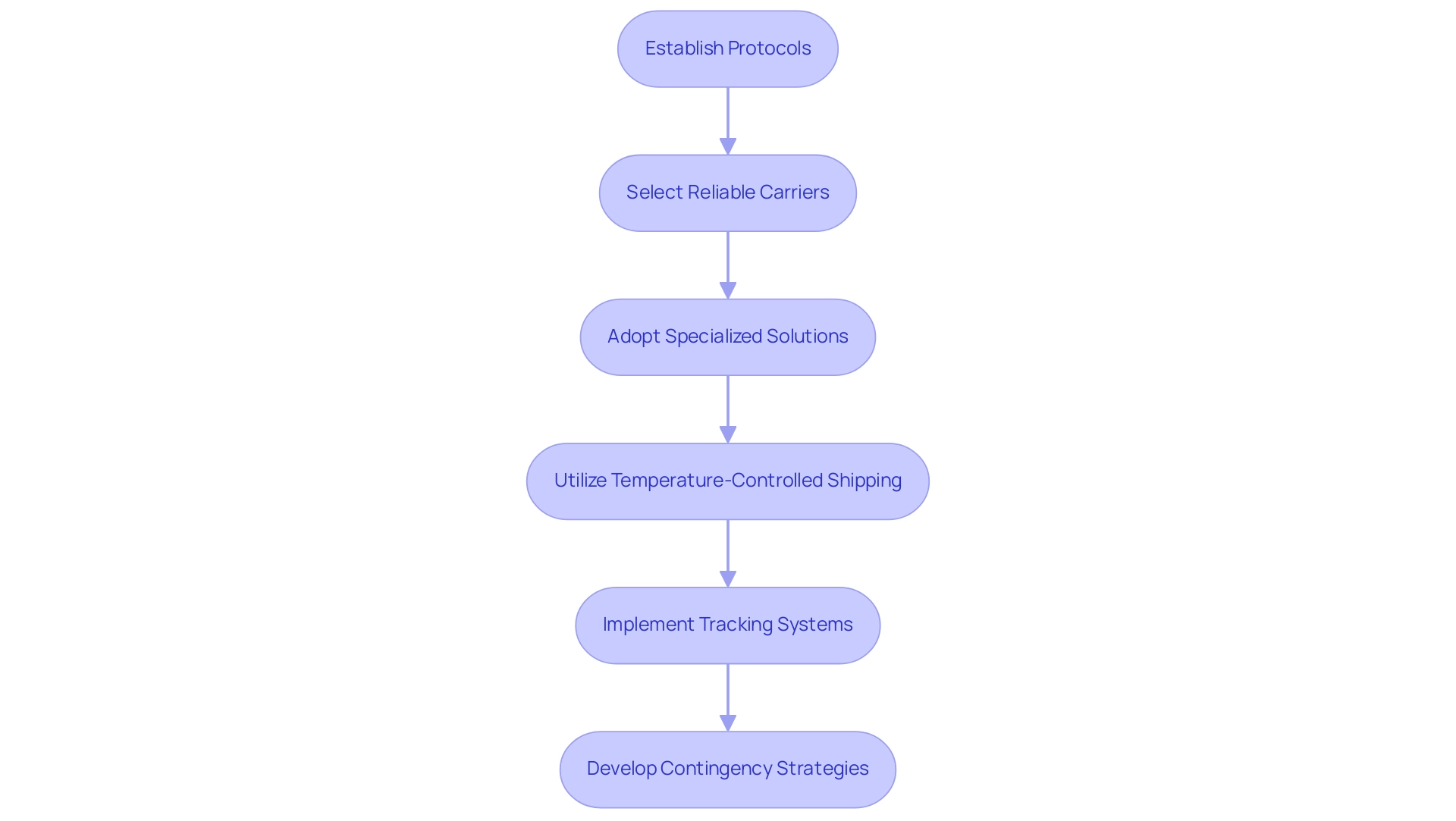
Implementing Effective Inventory Management Strategies
Implementing effective inventory management strategies is essential for the smooth operation of the clinical trial supply chain during research studies, particularly in light of the operational challenges presented by the global pandemic, which have made adherence to study protocols increasingly difficult. Comprehensive clinical study management services include:
- Feasibility studies
- Site selection
- Compliance reviews
- Setup
- Import permits
- Project management
- Reporting on serious and non-serious adverse events
All of which are essential in ensuring studies are conducted efficiently. Utilizing advanced inventory tracking systems is vital for providing real-time visibility into stock levels within the clinical trial supply chain, allowing organizations to respond swiftly to any potential shortages.
Techniques like Just-In-Time (JIT) inventory are particularly beneficial for the clinical trial supply chain, minimizing excess stock while ensuring that critical supplies are consistently available when needed. Regular audits and reconciliations are essential in the clinical trial supply chain, as they not only help identify discrepancies but also prevent shortages that could hinder progress. Furthermore, interim analyses should be conducted as planned, with adjustments considered if the planned information level cannot be reached, ensuring that studies remain on track.
Building strong connections with vendors is essential for enabling faster restocking of resources within the clinical trial supply chain, particularly since 72% of SMEs have indicated facing inconsistent delivery times because of untrustworthy providers. As Oliver Munro noted, 'Global warehousing property costs grew 10.1% in 2023,' underscoring the rising costs associated with inventory management. By enhancing inventory practices through JIT strategies and robust supplier partnerships, organizations can greatly minimize waste and refine their operations in the clinical trial supply chain, ensuring that medical studies not only advance without unnecessary hold-ups but also benefit local economies through job creation, economic development, healthcare enhancement, and international cooperation.
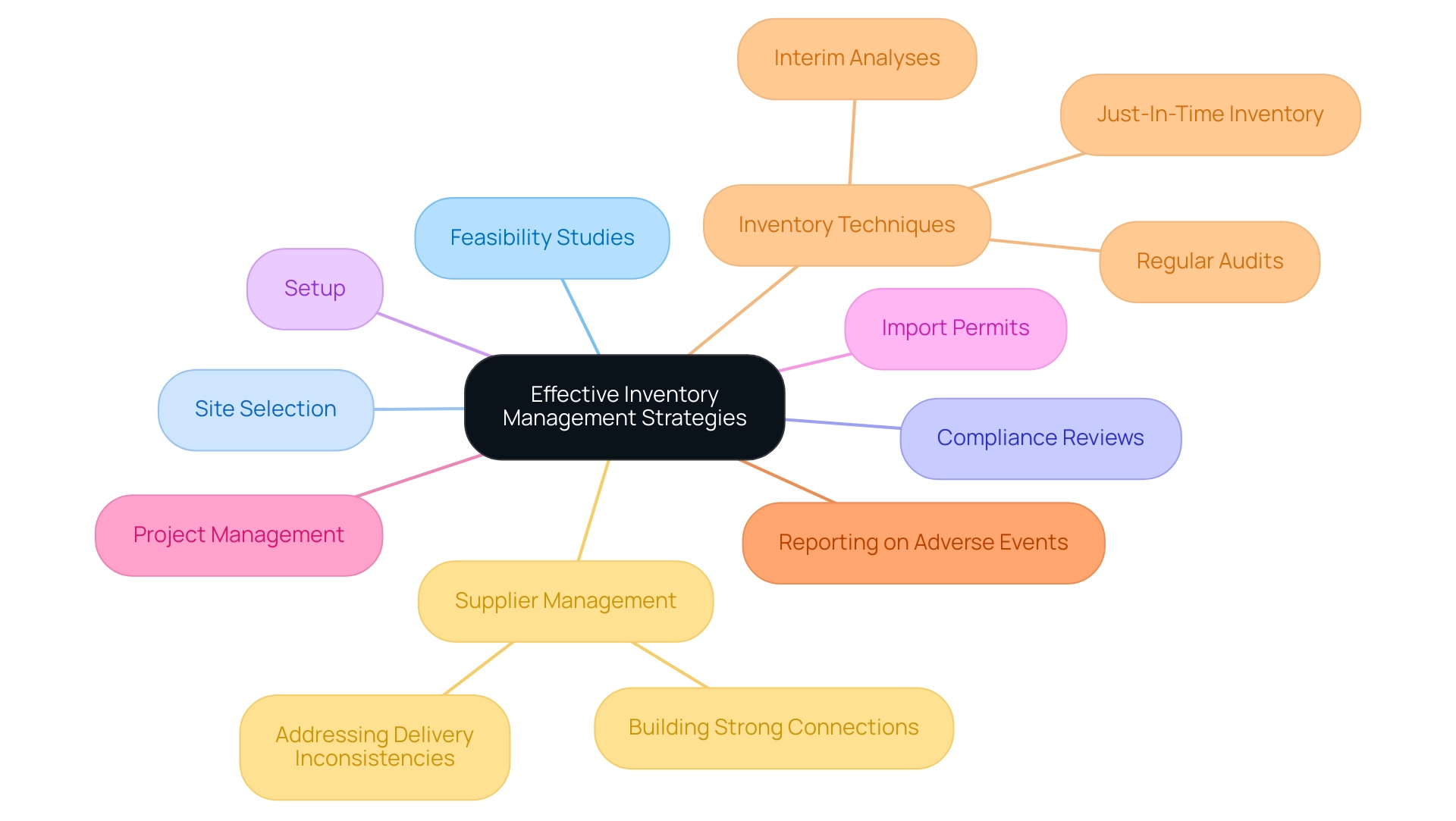
Enhancing Demand Planning and Forecasting Techniques
Improving demand planning and forecasting methods is essential for precisely anticipating future resource requirements in research studies. A thorough analysis of historical data and trends plays a vital role in this process, as it allows organizations to identify patterns that can inform their forecasts. Implementing advanced analytics and sophisticated software tools significantly improves forecast accuracy, enabling teams to adapt to fluctuations in demand effectively.
Furthermore, nurturing collaboration with medical teams to gain insights into study timelines and patient enrollment projections is essential for refining demand planning efforts. By adopting a proactive strategy to meet resource needs, organizations can ensure a steady flow of materials within the clinical trial supply chain, thus reducing interruptions in clinical research operations. Significantly, in Phase 3 studies, a statistical evaluation indicated an R-squared value of 37.2% with a mean absolute percentage error of 0.414, emphasizing the significance of thorough forecasting techniques to improve overall logistics performance.
This corresponds with the results from recent case studies, which highlight rectifying misalignments in health logistics to enhance forecasting precision and promote improved outcomes. The serious public health impact of poor demand forecasting cannot be overstated, as inadequate access to healthcare can lead to loss of lives. Therefore, transparency regarding the exploratory nature of these analyses is essential, as it ensures the reliability and robustness of the findings.
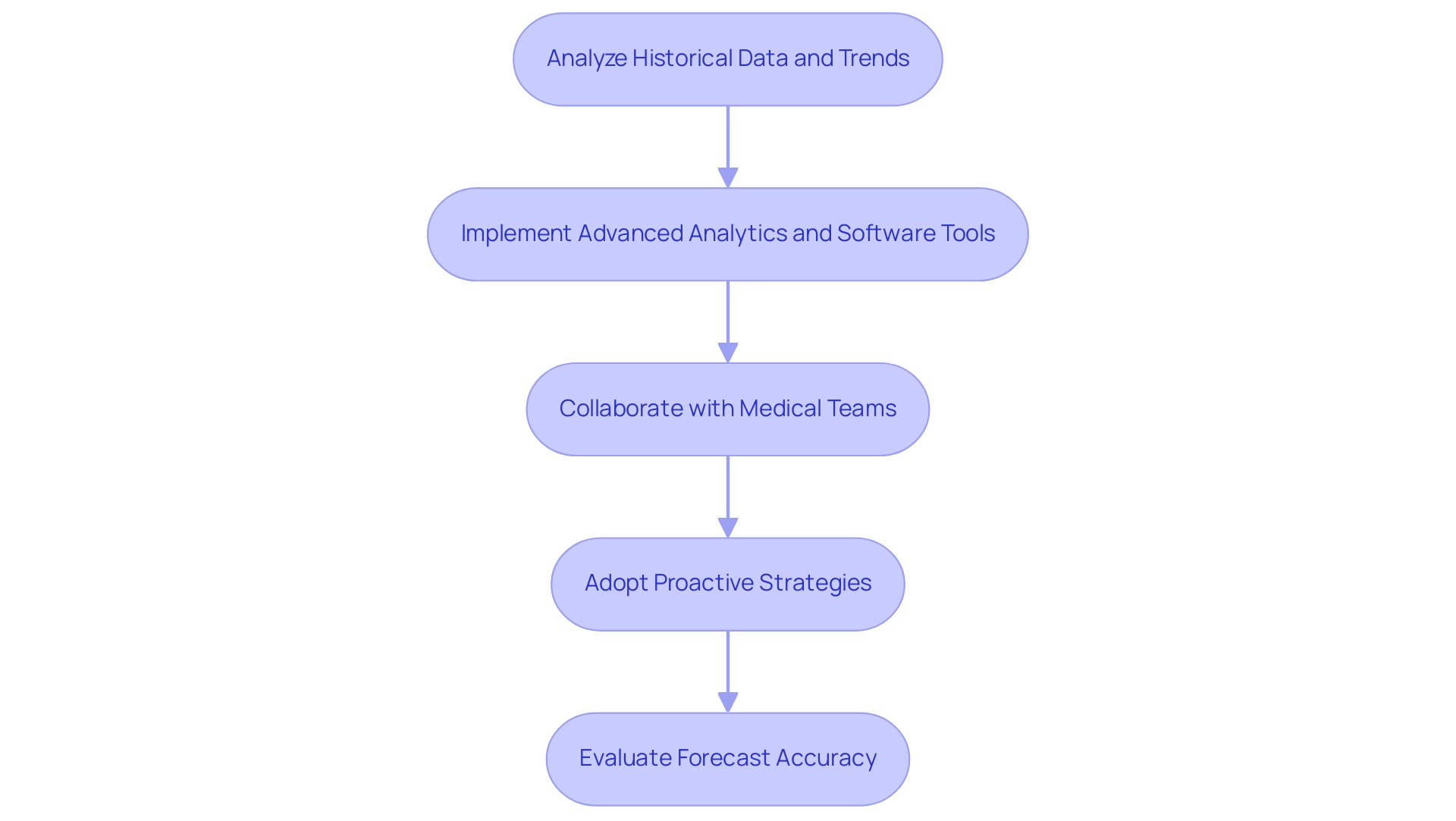
Developing Robust Sourcing Strategies for Supplies
Creating strong sourcing strategies is crucial for ensuring the success of clinical studies, which rely on an effective clinical trial supply chain, encompassing comprehensive services such as:
- Feasibility assessments
- Site selection
- Compliance reviews
- Setup
- Import permits
- Project management
- Reporting
This process begins with identifying and thoroughly vetting suppliers to guarantee adherence to stringent quality and regulatory standards. Creating long-lasting collaborations with trustworthy vendors not only improves the clinical trial supply chain stability but also greatly minimizes the chance of shortages, a vital element in upholding timelines.
Furthermore, diversifying the supplier base within the clinical trial supply chain plays a pivotal role in mitigating risks associated with over-reliance on a single source. The methodologies employed in the setup of the clinical trial supply chain include detailed planning and stakeholder engagement to ensure alignment with regulatory requirements, while project management within this chain involves continuous monitoring and adjustment to maintain timelines and budgets. The MEA healthcare experiment distribution and logistics market is anticipated to expand from USD 162.90 million in 2023 to around USD 302.14 million by 2033, requiring organizations to actively evaluate vendor performance.
The wider healthcare environment shows a physician practice management market valued at USD 118.9 billion in 2023, emphasizing the increasing need for effective resource management solutions. A pertinent example of strategic partnerships in healthcare logistics is the Bomi Group acquisition by UPS, illustrating how companies can enhance capabilities through collaboration. Furthermore, effective reporting mechanisms are crucial within the clinical trial supply chain for tracking study status, inventory, and adverse events, ensuring compliance with regulatory standards.
Keeping clear communication and performing regular assessments within the clinical trial supply chain can further strengthen these collaborations, ensuring access to the essential resources for successful experiments. Aditi Shivarkar, an expert with over 14 years in the field, emphasizes the critical nature of thoughtful sourcing strategies that prioritize both quality and reliability, especially within the clinical trial supply chain and in supplier vetting processes.
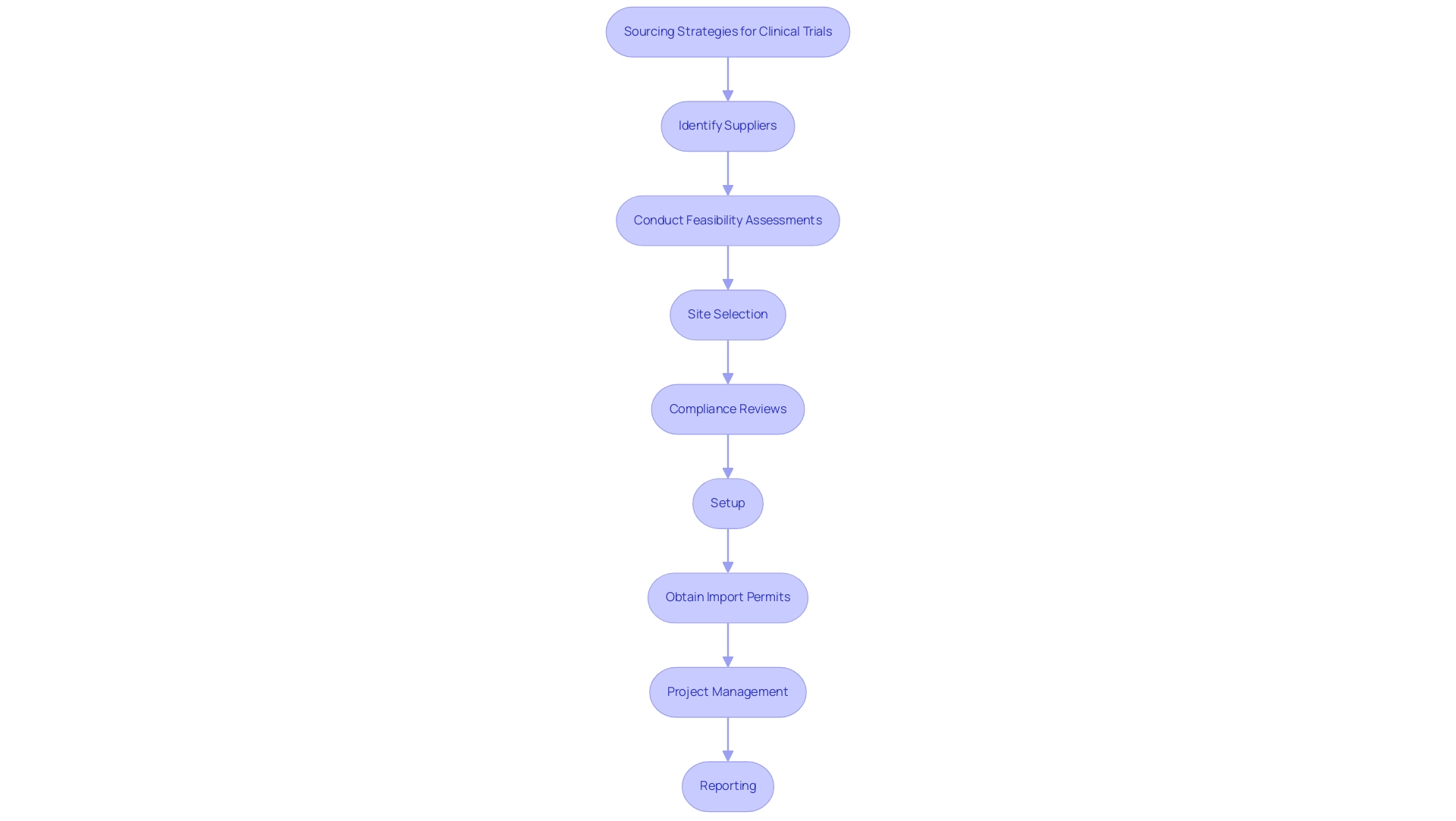
Incorporating Sustainability into Supply Chain Practices
Incorporating sustainability into logistics practices mandates a thorough evaluation of the environmental impact associated with sourcing, packaging, and transportation methods. Organizations can implement eco-friendly packaging solutions that not only reduce waste through effective recycling initiatives but also prioritize partnerships with suppliers committed to sustainable practices. The adoption of energy-efficient logistics further reduces the carbon footprint linked to medical studies.
As Brittney Elko, Senior Director of Technical Operations and Supply Chain at Aligos Therapeutics, articulates,
Explore best practice in close monitoring of transportation activities to guarantee timely delivery and minimize risk of loss or damage.
With more than 30 years of industry experience, Jan Pieter Kappelle highlights the significance of robust leadership in research resources to effectively address these sustainability challenges. Furthermore, the exploration of bespoke partnership packages can enhance collaboration, showcasing expertise while networking with decision-makers to drive sustainable practices.
A recent case study titled 'Levelling up vendor partnerships so that both sides win' highlights successful strategies for enhancing vendor relationships in healthcare logistics, demonstrating how collaborative efforts can yield mutual benefits. By embracing these sustainable strategies, organizations not only contribute to environmental preservation but also enhance their reputation among stakeholders and participants who prioritize corporate responsibility. This proactive strategy nurtures stronger connections within the research community while ensuring adherence to the rising need for sustainability in healthcare project logistics.
Future Trends in Clinical Trial Supply Chain Optimization
The supply network for medical research, particularly the clinical trial supply chain, is on the verge of transformation, propelled by innovative technologies like artificial intelligence (AI) and blockchain. Our extensive research management services enable:
- Feasibility studies
- Site selection
- Compliance reviews
- Setup
- Import permits
- Project management
- Reporting
These services significantly influence local economies through job creation, economic growth, and healthcare enhancement. We employ specific methodologies, including risk-based monitoring and adaptive study designs, to enhance project management efficiency.
AI's ability to analyze extensive datasets enables more accurate demand forecasting and inventory management within the clinical trial supply chain, allowing organizations to predict needs with greater precision. This is essential in a landscape where the growth in clinical trials is evident, as illustrated by Catalent's recent $2.2 million expansion of its clinical facility in Singapore. Furthermore, in August 2022, Bomi Group revealed intentions to be purchased by UPS, a decision that is set to improve global healthcare logistics capabilities and further optimize logistical dynamics.
Meanwhile, blockchain technology is emerging as a vital tool for enhancing transparency and traceability within the logistics network, ensuring that all materials are ethically sourced and adhere to stringent regulatory standards. This technology supports compliance reviews by providing an immutable record of transactions and material sourcing.
Furthermore, the trend towards decentralized trials is reshaping the clinical trial supply chain dynamics, compelling organizations to modify their strategies to support remote patient interactions and localized supply distribution. As Dipanwita Das, CEO & co-founder at Sorcero, notes, 'As we use more AI to analyze data that has PHI and does not, making sure that you're able to actually align with those data privacy requirements, which is essential for trust is going to be very important.'
Staying attuned to these advancements is paramount for organizations aiming to uphold a competitive edge in the ever-evolving field of clinical research, driving global health improvement through international collaboration and innovation in Medtech.
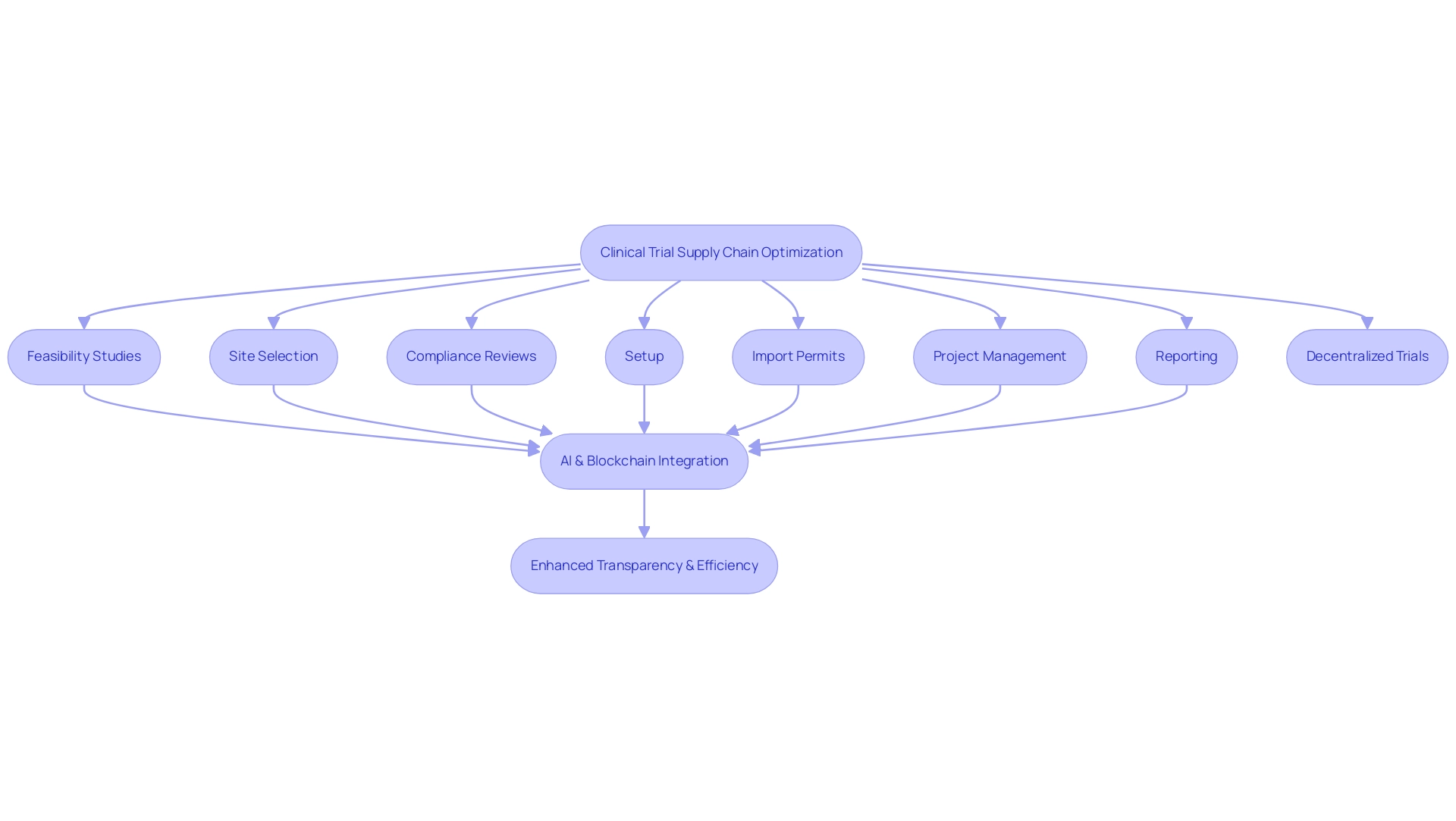
Conclusion
The clinical trial supply chain is a complex yet critical component of successful clinical research, impacting everything from the procurement of essential materials to the effective management of logistics and inventory. As highlighted throughout the article, mastering this supply chain is essential for maintaining trial integrity and ensuring timely outcomes. The integration of innovative strategies, such as advanced analytics and sustainable practices, enhances operational efficiency and addresses the myriad challenges faced by organizations in this sector.
Furthermore, the importance of robust partnerships with suppliers and logistics providers cannot be overstated. These relationships not only facilitate smoother operations but also contribute to the resilience of the supply chain against disruptions. By prioritizing effective demand planning, sourcing strategies, and sustainability, organizations can navigate the complexities of clinical trials more effectively, ultimately benefiting the broader healthcare landscape.
As the industry continues to evolve, embracing technologies like AI and blockchain will be crucial for optimizing supply chain processes. These advancements promise to enhance transparency, improve forecasting accuracy, and support the growing trend of decentralized clinical trials. In this dynamic environment, staying ahead of emerging trends and adopting a proactive approach will empower organizations to thrive, ensuring that clinical trials not only advance medical knowledge but also contribute positively to global health outcomes.
Frequently Asked Questions
What is the clinical trial supply chain?
The clinical trial supply chain involves the logistics of acquiring, storing, and distributing essential materials needed for studies, including investigational medications, medical instruments, laboratory resources, and packaging supplies.
Why is mastering logistics in clinical trials important?
Mastering logistics is crucial to ensure that experiments progress seamlessly and effectively, impacting the integrity and effectiveness of research.
What key areas are focused on in trial management services?
Key areas include site feasibility assessments, investigator selection, regulatory compliance reviews, trial setup, import permits, nationalization of investigational devices, project management, and detailed reporting.
How can resource deficits affect clinical trials?
Holds or deficits in resources can greatly influence study schedules and results, undermining the integrity and effectiveness of research.
What challenges do medical device startups face in clinical trials?
Medical device startups often face regulatory hurdles and recruitment issues, which our services help them navigate effectively.
What role do pharmaceutical and biotech companies play in the research project distribution market?
They significantly influence the expansion of the research project distribution market worldwide, as evidenced by recent industry developments.
What are some recent developments in the clinical trial supply chain?
Recent developments include Catalent's $2.2 million expansion of its supply facility in Singapore and Petrone Group's acquisition of COLCA-MS, highlighting a shift towards tailored solutions.
What obstacles complicate the shipment and storage of drugs?
Varying regional regulations and ethical dilemmas, especially in developing economies, complicate the shipment and storage of drugs.
Why is creating thorough protocols for material management and shipping important?
It is essential for enhancing logistics and transportation in research studies and ensuring the efficient management of resources.
What is the significance of choosing reliable carriers in research logistics?
Reliable carriers knowledgeable in research logistics are crucial for ensuring efficient resource management and successful shipping outcomes.
How can specialized solutions improve shipping outcomes?
Specialized solutions, such as alternative packaging and specific shipment handling procedures, can significantly enhance shipping outcomes.
Why is temperature-controlled shipping important?
Temperature-controlled shipping is critical for sensitive materials to ensure they remain within specified ranges throughout transit.
What role do advanced tracking systems play in logistics optimization?
Advanced tracking systems are important for precise monitoring in logistics optimization, helping to ensure the integrity of shipments.
What contingency strategies should be created for clinical trials?
Strong contingency strategies are needed to handle possible interruptions like delays or lost shipments, preserving the integrity of research timelines.
How do strategic partnerships impact healthcare logistics?
Strategic partnerships, such as the acquisition of Bomi Group by UPS, enhance global healthcare logistics capabilities, improving temperature-controlled logistics across multiple countries.




